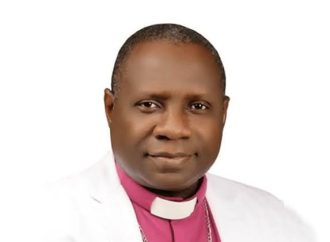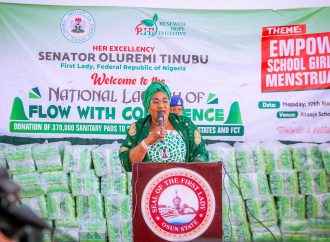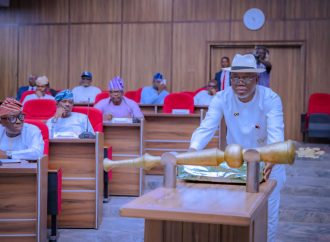Sources Reveal How Low-Level Officers Manipulated Presidential Pardon List The Attorney-General of the Federation and Minister of Justice, Lateef Fagbemi (SAN), has ordered a comprehensive, multi-agency review of the proposed presidential pardon list following growing controversy surrounding the inclusion of several questionable names. The review, spearheaded by the Ministry of Justice, involves the Economic and
Sources Reveal How Low-Level Officers Manipulated Presidential Pardon List
 The Attorney-General of the Federation and Minister of Justice, Lateef Fagbemi (SAN), has ordered a comprehensive, multi-agency review of the proposed presidential pardon list following growing controversy surrounding the inclusion of several questionable names. The review, spearheaded by the Ministry of Justice, involves the Economic and Financial Crimes Commission (EFCC), the National Drug Law Enforcement Agency (NDLEA), the Independent Corrupt Practices and Other Related Offences Commission (ICPC), and the Nigeria Police Force. This unprecedented move comes amid mounting concerns that some individuals who did not meet the established criteria for clemency may have been illicitly added to the list by lower-level officials.
The Attorney-General of the Federation and Minister of Justice, Lateef Fagbemi (SAN), has ordered a comprehensive, multi-agency review of the proposed presidential pardon list following growing controversy surrounding the inclusion of several questionable names. The review, spearheaded by the Ministry of Justice, involves the Economic and Financial Crimes Commission (EFCC), the National Drug Law Enforcement Agency (NDLEA), the Independent Corrupt Practices and Other Related Offences Commission (ICPC), and the Nigeria Police Force. This unprecedented move comes amid mounting concerns that some individuals who did not meet the established criteria for clemency may have been illicitly added to the list by lower-level officials.
NDLEA Launches Digital Portal For Drug Tests And Visa Clearance Certificates
According to The Punch, more than half of the individuals originally recommended for presidential pardon may be dropped after the agencies conclude their vetting process. President Bola Tinubu, who is said to be awaiting the final submission of the reviewed list, reportedly directed that due diligence and transparency must guide the exercise. This follows revelations that some names on the initial list were smuggled in without authorization, prompting alarm within the government and among security institutions.
The President had earlier exercised his constitutional powers to grant clemency to 175 convicted persons across the country. However, the announcement quickly triggered public and institutional backlash, especially after law enforcement and anti-graft bodies discovered that several of those listed had ongoing or unresolved corruption, drug-related, and criminal cases. Officials within the EFCC, ICPC, NDLEA, and police jointly raised objections, warning that granting clemency to certain individuals could undermine ongoing investigations and weaken public trust in the justice system.
An insider within one of the security agencies disclosed that the manipulation of the list occurred at the committee level, where some low-ranking officers allegedly inserted names that were never approved for consideration. The source emphasized that President Tinubu was unaware of these additions, which explains the decision to suspend the release of the final list pending a thorough integrity screening. “Some low-level officers smuggled in names not originally recommended. Some of those names didn’t meet the eligibility criteria, and their cases are still active. Thankfully, they remain in custody and have not been released,” the official said.
Multi-Agency Vetting and Integrity Checks Intensify
Multiple top officials within the Federal Government have confirmed that the Attorney General’s Office has circulated the controversial list to the EFCC, ICPC, NDLEA, and the police for comprehensive background checks. The objective of this exercise is to verify the police for comprehensive background checks. The objective of this exercise is to verify the integrity of each nominee and ensure that only individuals who genuinely qualify for presidential pardon are included. A senior official in Fagbemi’s office explained that the process is part of a deliberate effort to prevent the recurrence of past scandals that tainted previous administrations’ clemency programs. “The review is ongoing, and all relevant agencies have been directed to conduct a full vetting of the list. This is a transparent process designed to uphold the integrity of the justice system,” the source noted.
Officials in the Presidency echoed similar sentiments, emphasizing that President Tinubu’s administration remains committed to accountability and the rule of law. One presidency insider revealed that the findings so far suggest that a significant number of the listed names will not survive the scrutiny of the anti-graft and law enforcement agencies. “From what I’ve seen, more than half of the nominees are likely to be dropped after the review. The government does not want to grant clemency to anyone with unresolved criminal or corruption-related issues. This process is to ensure credibility and fairness,” the source stated.
Another senior Federal Government official disclosed that some agencies had already submitted preliminary reports indicating that certain individuals on the list were still under investigation. These revelations have further reinforced the need for rigorous cross-checking before the list reaches the President’s desk for final approval. “Each agency is reviewing the nominees based on its intelligence and operational data. It’s a standard integrity test to ensure no one currently facing trial or investigation benefits from the clemency process,” the official explained.
The controversy underscores the administration’s sensitivity to public perception and its determination to maintain a clear distinction between legitimate acts of mercy and potential abuse of presidential powers. Legal experts have also weighed in, describing the multi-agency review as a welcome development that could restore public confidence in the pardon process. By subjecting nominees to detailed scrutiny, the government aims to eliminate any suspicion of favoritism or political influence.
The exercise is expected to conclude in the coming weeks, after which the vetted list will be forwarded to President Tinubu for final approval. Observers believe that this development marks a significant shift toward institutional integrity within Nigeria’s justice and governance systems. If successfully executed, it could set a precedent for future clemency exercises, ensuring that only deserving individuals benefit from presidential mercy.
The Attorney-General, known for his commitment to legal propriety, is reportedly determined to ensure that the revised list reflects fairness, justice, and transparency. Sources within the Ministry of Justice indicate that Fagbemi has ordered all relevant agencies to document their findings meticulously to create a permanent record that prevents similar irregularities in future pardon exercises.
As the nation awaits the final outcome, the public’s attention remains focused on whether the Tinubu administration will use this opportunity to demonstrate a new standard of accountability in Nigeria’s justice system.



















Leave a Comment
Your email address will not be published. Required fields are marked with *